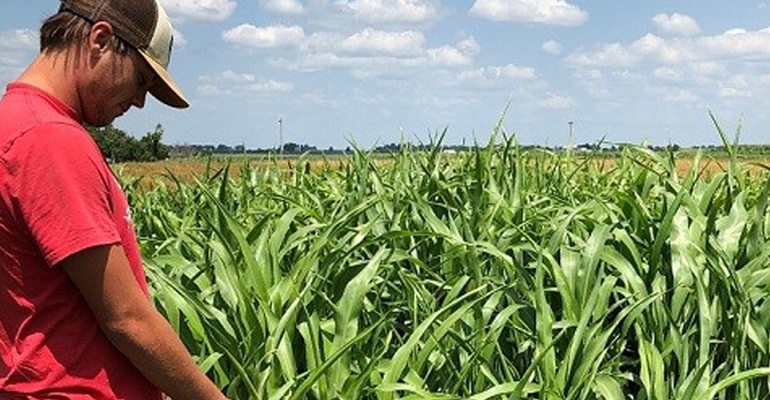August 8, 2019

An upcoming field day at the Neely-Kinyon Research and Demonstration Farm in southwest Iowa will focus on the challenges of the 2019 cropping season. A historically wet spring impacted planting and weed management, followed by dry weather in July. This year’s challenges will affect yields at harvest — how much is still being determined.
Field day attendees will get a timely update, with the latest information on producing organic crops, cover crops, soil and water quality practices, and no-till.
The Aug. 20 field day at the farm near Greenfield is presented by the Iowa State University organic ag program. ISU agronomists and organic specialists will discuss best management practices for organic corn and soybean production from 4 to 7 p.m., along with research results on oats and alfalfa, which serve as soil-building crops in the organic rotation.
Cover crops for prevent planting acres
Options for prevented plantings will also be discussed, including planting cover crops to begin the transition to certified organic production. Cover crops, such as sorghum-sudangrass, offer multiple benefits. They provide a cover for prevented planting acreage, and the grass can be baled for livestock feed. Details on crop insurance considerations for prevented planting fields that are planted to cover crops can be found at the Risk Management Agency website.
Erika Lundy, beef cattle specialist for the Iowa Beef Center at ISU Extension, will provide information on summer annual cover crops planted at the farm that can be used for grazing and livestock feed.
Measurable results, timely management
Through timely weed management, longer crop rotations and appropriate manure-based fertilization, the organic program used at the Neely-Kinyon Farm has demonstrated comparable organic corn, soybean, oat, alfalfa, vegetable and fruit yields compared to conventionally grown crops.
Organic producers typically receive a premium for their product, with organic soybeans currently priced at $19 a bushel, and corn at $9 a bushel — about twice as high as current prices for conventional crops.
Soil quality with organic fields is usually high, thanks to the use of extended crop rotations, cover crops and compost applications — in addition to organic no-till farming. Research from the USDA Agricultural Research Service in Ames has documented a 50% reduction in nitrate loading from organic versus conventional fields, which will be discussed at the field day.
Presentation on organic no-till farming
A farm tour will be followed by a light supper, featuring local and organic foods, and an after-supper discussion on organic no-till farming. That presentation will be made by Levi Lyle, an organic farmer from Keota, Iowa. He is working with ISU and the USDA Natural Resources Conservation Service to develop best management practices for organic no-till.
Kathleen Delate, a professor and ISU Extension organic specialist in horticulture and agronomy, will speak on organic grain; forage and vegetable crops; and soil and water quality under the organic fields. Paul Scott, a corn breeder from USDA ARS, Ames, will discuss his efforts in breeding corn under organic conditions to develop high-performing hybrids. Lundy will discuss the benefits of cover crops, including sorghum-sudangrass, Japanese millet, pearl millet and teff.
The field day event begins at 4 p.m., with the light supper following at 5:30 p.m. The farm is at 2557 Norfolk Ave., near Greenfield. To reach the farm, go 2 miles south of Greenfield on Highway 25, 1 mile east, and a half-mile north. For more information, contact Delate at [email protected] or 515-294-7069. Local information can be obtained from Kathy Rohrig, ISU Extension Adair County office, at 641-743-8412 or [email protected].
This field day is supported by the Leopold Center for Sustainable Agriculture, a USDA NRCS Conservation Innovation Grant and the ISU Extension office in Adair County.
To learn more about the ISU organic ag program, visit the ISU organic ag program webpage.
An earlier event, called the Organic Agronomy Training Series, will be held Aug. 14-15 in La Crosse, Wis., and is geared toward professionals who want more information about transitioning to organic farming.
Source: ISU, which is solely responsible for the information provided and is wholly owned by the source. Informa Business Media and all its subsidiaries are not responsible for any of the content contained in this information asset.
You May Also Like




